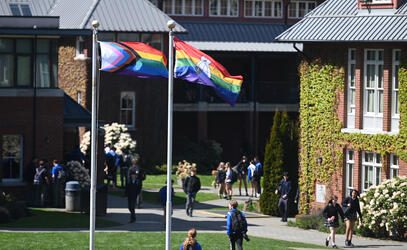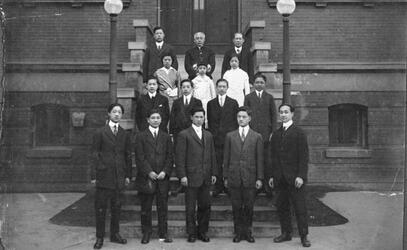
As part of Pink Shirt Day last term, Grade 12 student and member of the Well-being Council, Cynthia Qiu, bravely took to the podium to talk to her peers at an assembly around an important topic, bullying. As Well-being Week at SMUS has just wrapped up, Cynthia's speech is a reminder that these conversations can't just happen around significant dates. These hard conversations should be continuous to help spread awareness and education on how we all have a role to play in putting an end to bullying.
by Cynthia Qiu, Grade 12
Barack Obama once said, “We have got to dispel this myth that bullying is just a normal rite of passage.” By this, I think he means that bullying is starting to be viewed as something normal that’s expected to happen. It’s starting to be seen as a normal part of what we experience in our lives.
But why should it?
Bullying should never be normalized.
It’s possible that many underestimate the harm bullying brings, both mentally and physically. We often do not even realize that it’s happening around us after we get used to it. And even when we do realize it, we might not know what to do. Going through secondary school is not an easy experience, and the chance of being bullied is high. According to the 2019 Canadian Health Survey on Children and Youth, 71 percent of youth reported experiencing at least one form of bullying in the past twelve months.
For some students in our school community, bullying may seem like a distant topic, but it happens all across the country, from the playground to online group chats. Students who are bullied in school often develop a fear of attending their classes, and many of them are forced to transfer to another school as they see this as the only solution to get away from bullies.
We all may see bullying differently, be it physical, verbal, social, or cyberbullying. All forms of it are equally harmful, whether or not it's being purposefully excluded from an activity or being threatened online.
Some people may call bullying a “character development arc” or even the popular social media concept “a canon event”, but in reality, it rips and tears us down, especially when it occurs to teenagers.
Bullying may cause long-lasting trauma, leading to feelings of rejection, exclusion, isolation, and low self-esteem. They eventually develop a poor self-image, affecting proper personality development.
While it is easy to perceive the acts and impacts of bullying, it is harder to see the underlying phenomenon behind it. People find discomfort with those who are different from them, and those differences can be as big as someone’s race or as trivial as someone’s shoe brand. I was bullied before at another school because I spoke a different dialect of Chinese. My former classmates picked on me because I seemed and sounded different from them. After all, I somehow fit into their stereotype of the “weird new transfer student from outside the city.”
I then discovered a similar story by Nigerian writer Chimamanda Adichie; she mentions the dangers of stereotyping in her speech “The Danger of a Single Story.” She recounts a time when she visited the rural village of her family’s domestic helper, who was a boy younger than her. When the boy’s mother showed Adichie a beautifully woven basket that his brother made, she was shocked. She did not view them as equals who were able to craft something. Before Adichie got to know them, she couldn't see them as anything else but poor. A single story was created in her mind before she even met them.
The danger of fitting someone into a stereotype immediately is huge.
Alike to what Adichie mentioned, my former classmates saw me as nothing else other than a strange outsider, and I couldn't be like them or any other middle-schooler who wanted to make friends.
Bullies tend to pick on people who seem different from the rest, when in fact, they are no different from others. And even if they are, that does not give bullies the justification for their actions. Our differences and uniqueness are what we have in common, and it should be something that unites us, rather than divide us.
Having shared the impacts and the reasons why bullying happens, the important thing that we should focus on now is what our school community and we, as individuals, should do to stand up against bullying. One person can’t do it alone.
In our school, we can make sure that we foster an environment of empathy and respect: students should feel safe around their teachers and peers; awareness should be raised about bullying prevention, and reporting of observed bullying should be encouraged.
The school has already made efforts towards it by creating the “Equity, Diversity, and Inclusion” statement, anti-bullying programs, and the ERASE (expect respect and a safe education) anonymous reporting program.
As for individuals, we have to try our best to be kind to one another; it is crucial to be inclusive towards everyone and to never judge others by what they seem or by a few stories you’ve heard about them from other people.
Moreover, be aware of what you say to each other on social media. Before you send a message, think to yourself: “Is this something kind, true, or even necessary?”
Only by all members of our school community following and implementing these measures can we make sure that bullying never happens in our environment.
With all being said about bullying and its solutions, we can’t just sit around and think it will go away by itself. As we go through life, encountering some type of adversity is to be expected. We need the courage to transcend adversity and choose our rite of passage in the face of hardship. We have to think about how we could go beyond these situations; how we can strive to ensure someone else doesn’t have to experience the same injustice. With everyone working towards a vision of an ideal community, we get closer to a better future. Or at least a better tomorrow to start with.
I’ll leave you with this: be conscious of the fact that bullying is a serious issue that happens all around us. Raise awareness about it. If you ever witness it, do not be a bystander, as “what hurts the victim the most is not the cruelty of the oppressor, but the silence of the bystander”.



